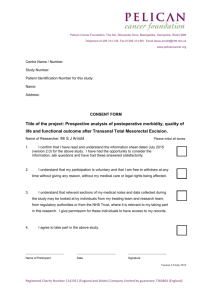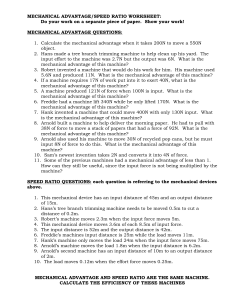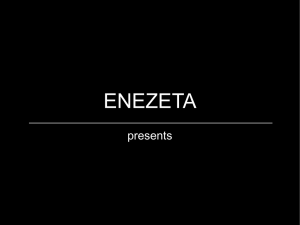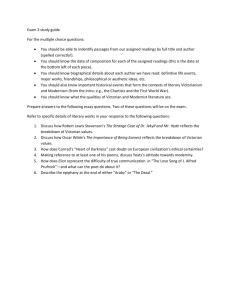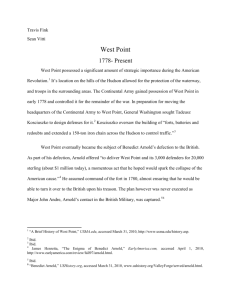Lecture Seven
advertisement
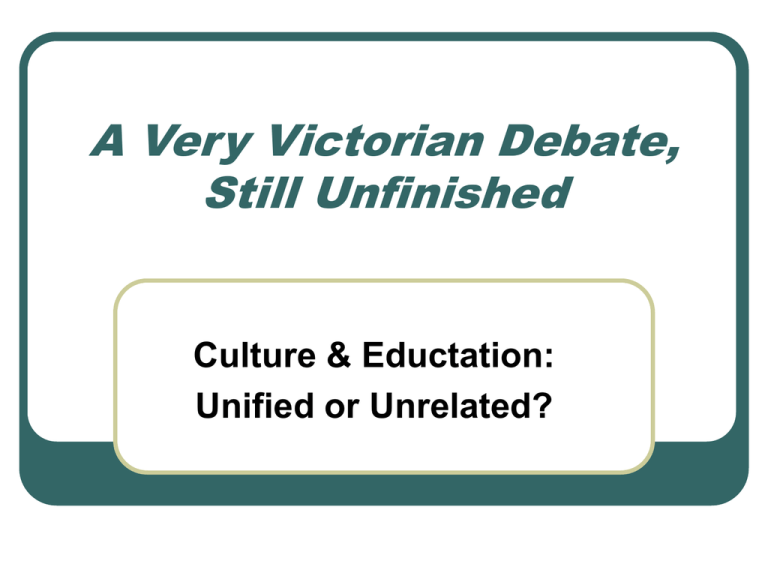
A Very Victorian Debate, Still Unfinished Culture & Eductation: Unified or Unrelated? William Ayers: The ‘Weather Underground’ William Ayers: ‘Educate to Enculturate’ In Teaching toward Freedom, William Ayers illuminates the hope as well as the conflict that characterizes the craft of education….as a way for students to become more fully human, more engaged, more participatory, more free…. For Ayers, noted educator and activist, “the allure of teaching, that ineffable magic that draws me and many others back to the classroom again and again, comes from the particularly precious ideal that lies directly at its heart: Teaching, at its best, is an enterprise geared toward helping every human being reach the full measure of his or her humanity.” “…society needs to understand what it means to teach toward freedom. . . Ayers's asks that students imagine different future worlds where justice is better served and where we create a vision needed for a better world." Anthony Burgess: the Cultural Fallacy Novelist Scholar Playwright Composer Poet Broadcaster Theologian Etc. etc. Anthony Burgess A Clockwork Orange “There was music playing, a very nice malenky string quartet, my brothers, by Claudius Birdman, one that I knew well. I had to have a smeck, though, thinking of what I'd viddied once in one of these like articles on Modern Youth, about how Modern Youth would be better off if A Lively Appreciation Of The Arts could be like encouraged. “Great Music, it said, and Great Poetry would like quieten Modern Youth down and make Modern Youth more Civilized. Civilized my syphilised yarbles. Music always sort of sharpened me up, O my brothers, and made me like feel like old Bog himself, ready to make with the old donner and blitzen and have vecks and ptitsas creeching away in my ha ha power.” “Sweetness & Light”…. “Educate an idiot and get an Educated idiot.” Clockwork Orange: Alex the Droog: • • • • Culture makes cultured hooligans Smarter at being violent Heightens the intensity of violent experience Makes violence a cultured æsthetic experience Conclusion: culture and education is neutral on moral behavior. Matthew Arnold: “Culture” More oppositional—or binary—analysis Why not state it plainly? Matthew Arnold is an impossible prig. • Gave the “Victorian stuffed-shirt” stereotype its embodiment. “Inspector of Schools” Thomas Arnold: Rugby Matthew Arnold’s father, Thomas Arnold, was the head of Rugby School and a important proponent of ‘Muscular Christianity’ • The sport of Rugby (& thus American football) was invented during Thomas Arnold’s tenure there: an expression of ‘clean masculinity.’ Immortalised in Tom Brown’s Schooldays. Matthew Arnold: “Culture & Anarchy” Without “Culture”—defined by Matthew Arnold as “the best that has been thought & known in the world”— society becomes anarchic. In our terms, free-market capitalism makes individualism the primary virtue—the individual becomes the primary arbiter of virtue and action—and thus society takes selfishness as its dominant value. With no predominant concern for the ‘public good’, society becomes an anarchy of consumption. Why was there no shared values? Why did free-market capitalism gain ascendancy in the Victorian Age? The Arnold Problematic Unspoken in Matthew Arnold: • • • • Christianity was a shared system of belief for England, which asserted higher values than individualism. Arnold did not personally believe in the dogmas of Christianity: helped propagate the idea that Faith was no longer viable (“Dover Beach” e.g.) Christianity replaced by Education—i.e. cultural education. • Culture replaces Religion. The Pedagogical Fallacy: • Education—teaching culture—effects moral behavior • Paradox: a Utilitarian view of Culture & Education “The Woman” A Victorian Triptych Fiction & Life under Victoria’s matriarchal Regnancy A Victorian dialectical position: still uncomprehended Chance to see what was—through the mind of literature—not what our contemporaries think there was or want there to have been. Examine what is being stated here about Life & Literature—Culture & Fiction. • P1: Domestic power is primary power • P2: Women control domestic power • C: Women control Victorian power. • A matter of the function of Art in Society. The Reality of Fiction Sherlock Holmes: the Power of Woman Three Victorian short stories on or about ‘the woman question.’ Chance to see what was—through the mind of literature—not what our contemporaries think there was or want there to have been. A triptych of aspects on woman as a subject of direct attention. Male-Female Cultural Dichotomy Dionysus • • • • • Chthonic (Earthly) Enclosing, nurturing Emotional, Expressive Changeable Female Apollo • • • • • Ætherial (heavenly) Penetrating, dominant Rational, controlled/ing Rigid & Fixed Male Sherlock Holmes: the Power of Woman The female-male to Dr. Watson’s stolid Victorian masculinity. • • • • • (Watson’s dullness sharpens the portrait of Holmes’ intelligence, & gives the reader an identity-point in the narrative) Neurotic (p.1557) Domestic (22 Baker St. & his name) External appearance controlled and altered to suit desire of mind (i.e. of power.) (This matches a female quality: in the text, of Irene Adler. • p.1567 “his expression, his manner, his very soul seemed to vary with every fresh part that he assumed.” Succeeds by reasoning and observing: or rather, by observing then reasoning. • • p.1558: “you see, but you do not observe. P.1559: “It is a capital mistake to theorise before one has data.” • p.1558: “You would certainly have been burned [as a witch] had you lived a few centuries ago.” Woman’s domestic power is the power of observation, then manipulative action. “The woman” Power of Social Perception Holmes in turn sees through the social appearances of others: i.e. the disguise of the King of Bohemia. Irene Adler has power of disguise—ability to control dress for social (i.e. real power) effect—and to see through disguise (Holmes’): by power of domestic perception: • p. 1571 “….when I found how I had betrayed myself, I began to think.” Irene, like Holmes, is man-woman combination: • p.1562: “face of the most beautiful of women, and mind of the most resolute of men.”
